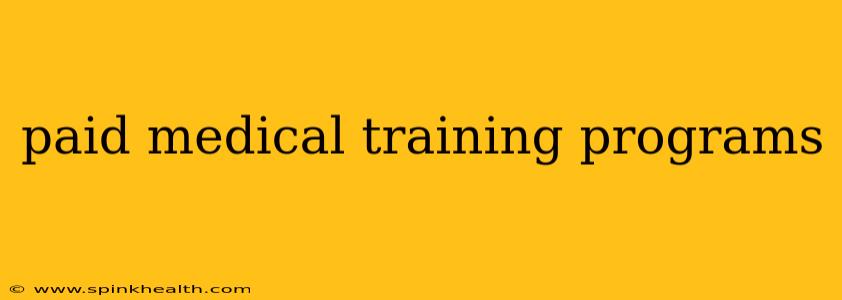The world of healthcare is constantly evolving, demanding skilled professionals with up-to-date knowledge and specialized training. For those passionate about medicine but lacking the traditional route to a medical career, paid medical training programs offer a viable pathway. This isn't just about earning a paycheck; it's about investing in your future, building a robust skillset, and potentially opening doors to exciting career opportunities. But navigating this landscape can be daunting. Let's explore the world of paid medical training programs, answering some key questions along the way.
What are Paid Medical Training Programs?
Imagine a scenario where you're earning while you learn. That's the essence of paid medical training programs. These programs provide hands-on experience and structured learning in various healthcare fields, from medical assisting to surgical technology. They aren't free, as you're receiving valuable instruction and often securing employment upon completion. This approach differs from traditional academic pathways, which might involve significant upfront tuition fees and potential debt.
The programs themselves vary considerably. Some are intensive, short-term courses designed to quickly equip individuals with specific skills. Others are longer, more comprehensive programs leading to certifications or associate degrees. The length, intensity, and specific skills taught depend entirely on the chosen field and the training provider.
What Types of Paid Medical Training Programs Exist?
The range of paid medical training programs is vast and diverse. Here are a few examples:
- Medical Assistant Programs: These programs prepare individuals for roles assisting physicians in clinics and hospitals. They learn vital skills like taking patient histories, administering medications, and performing basic diagnostic tests.
- Phlebotomy Technician Programs: Focusing specifically on blood collection, these programs train individuals in venipuncture techniques and proper specimen handling.
- Surgical Technology Programs: These intensive programs provide the knowledge and skills needed to assist surgeons during operations. They're hands-on and require precision and a strong understanding of surgical procedures.
- Emergency Medical Technician (EMT) Programs: These programs train individuals to provide emergency medical care in pre-hospital settings. They involve rigorous training in advanced life support techniques and emergency response procedures.
- Pharmacy Technician Programs: These programs train individuals to assist pharmacists in dispensing medications, maintaining inventory, and providing customer service in pharmacies.
This is just a small selection; many other specialized programs exist, catering to various niches within the healthcare industry.
What are the Benefits of Paid Medical Training Programs?
The advantages of paid medical training programs extend beyond simply earning a salary during your training:
- Earning while learning: This minimizes financial strain and potentially avoids student loan debt.
- Hands-on experience: Many programs incorporate practical training, providing invaluable experience before entering the workforce.
- Faster entry into the field: Compared to traditional degrees, these programs often lead to faster employment opportunities.
- Specialized skills: Programs focus on specific areas, making graduates highly marketable to employers.
- Potential for career advancement: Many programs serve as stepping stones to further education and career progression within the healthcare sector.
How Much Do Paid Medical Training Programs Cost?
The cost of paid medical training programs varies greatly depending on the length, intensity, and institution providing the training. Some programs may involve modest upfront fees, while others may incorporate tuition reimbursement or deferred payment plans. It is crucial to research individual programs thoroughly and understand the full cost commitment before enrollment.
How Can I Find Reputable Paid Medical Training Programs?
Finding a reputable program requires thorough research. Look for programs accredited by recognized organizations and those with a proven track record of successful graduates. Read reviews, speak to alumni, and carefully examine the curriculum to ensure it aligns with your career aspirations. Consider exploring programs offered through established healthcare institutions, community colleges, and vocational schools.
What are the Job Prospects After Completing a Paid Medical Training Program?
Job prospects vary depending on the specific program and the current healthcare job market. However, many of these programs prepare individuals for roles with high demand, offering good career stability and potential for growth. The specialized skills acquired often make graduates highly sought after by employers.
The path to a fulfilling career in healthcare is paved with numerous options. Paid medical training programs represent a strategic and potentially lucrative avenue for those seeking a quicker, more financially viable route into the field. By carefully researching and selecting a program aligned with your goals, you can embark on a rewarding journey of learning and professional advancement. Remember to always verify the accreditation and reputation of any program before committing to enrollment.

